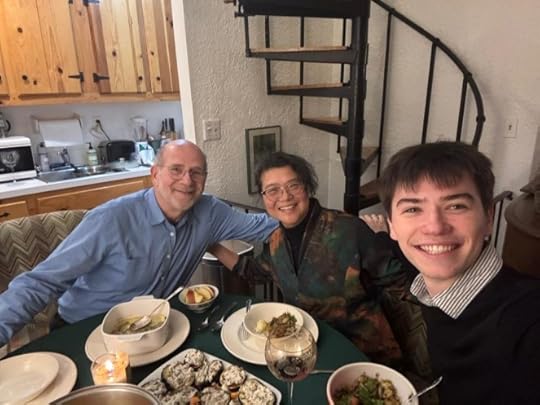Lijia Zhang's Blog, page 9
February 25, 2025
26 February, 2025 01:02
The other evening, I dined with friends at Peacock Restaurant, right beside Westminster Bridge. As I stepped out into the crisp night air, my saw Big Ben, its golden face aglow against the darkened sky. Just beyond, around the bend of the river, the London Eye loomed in quiet majesty. These two sentinels of the Thames, standing watch on either bank, seemed to whisper of history and time itself. In that moment, I felt a quiet gratitude: how fortunate we are to call a city as breathtaking as London as home.

February 22, 2025
The origin of totalitarian
Our book group has just read a powerful and timely book: The Origins of Totalitarianism by Hannah Arendt. It is essential in understanding the dangers of authoritarianism. Arendt’s insights on how populism, when mixed with propaganda and a disregard for truth, can erode democracy are strikingly relevant today.
Trump’s claim that Ukraine invaded Russia is a blatant example of disinformation—twisting reality to serve a political narrative. It’s a classic authoritarian tactic: distort the truth, sow confusion, and undermine democratic institutions.
February 17, 2025
Amitav Ghosh
Somehow, I seem to know half of New York. The best part of the trip was reconnecting with old friends, slipping back into conversations as if no time had passed.
On the eve of my departure, I had the great pleasure and honor of being invited to the home of Amitav Ghosh, a writer of towering stature, his shelves lined with accolades. I had just finished his latest book, Smoke and Ashes: A Writer’s Journey through Opium’s Hidden Histories, and loved every page.
Beyond his literary brilliance, Amitav is a warm and generous host, as well as an exceptional cook. That evening, he prepared an Indian feast, a lavish spread of more than ten dishes, each one bursting with spice and history.
Seated around the dinner table, alongside his wife Debbie—herself a gifted writer—were two other writers, and I had brought along our mutual friend Dana, an Armenian-American writer. The night unfolded in a symphony of flavors and ideas, the conversation as rich and layered as the food before us.
Lively debate, deep intellect, and a table full of exquisite dishes—what more could one ask for?
February 16, 2025
Adelphi
My Talk at Adelphi University
Let’s be honest—getting paid for a talk is always nice. But with payment comes pressure: you simply cannot bomb. So, I always feel a little more nervous when delivering a paid lecture.
That’s why I was immensely relieved (and frankly, quite pleased with myself) when my talk at Adelphi University—a lovely private institution in Garden City, New York—went down brilliantly. Hosted by the Bhse Center for Global Understanding, the event drew students from multiple departments, along with faculty members. I shared my life story, my journey to becoming a writer, and delved into gender-related issues. The audience was wonderfully engaged, asking thoughtful and challenging questions. The best part? A trip to NYC!
February 10, 2025
Friends
I am incredibly fortunate to have wonderful friends across the world, as one of my Facebook friends recently reminded me. Staying with them offers not only warmth and companionship but also the chance to know them more deeply.
The other day, I prepared a meal and invited Luca—the younger son of my dear friend Joe, an aspiring actor who is studying drama —to join us at my host Don Frantz’s home. As we shared stories of our lives and careers, I discovered that Don is not only a distinguished theatre director but also the mastermind behind the Amazing Maize Maze and a three-time Guinness World Record holder for the world’s largest maze. What an extraordinary revelation!
February 9, 2025
The outsiders
I’m staying with my friend Don Frantz, a director and producer with an impressive portfolio of Broadway shows. Naturally, he took me to see one.
Last night, we watched The Outsiders, a new Broadway musical adapted from S.E. Hinton’s novel. Many might be familiar with the film, but on stage, the story unfolds with a raw, visceral energy—a coming-of-age tale that feels like a cross between West Side Story and Grease, yet entirely its own.
What a show! Visually stunning, aided by modern technology—the burning of the old church was breathtaking in its realism. But even more striking was the performance itself. Sitting in the front row, I saw tears and snot fly from the actors’ faces, felt the intensity of their emotions, and marveled at the skillful storytelling. And, of course, being a musical, I must mention the lyrics—lyrical, poignant, unforgettable.
If there’s one criticism, it’s that some character development felt a little rushed, likely an inevitable challenge when juggling so many characters in a single production.
Still, I was enthralled. More than just the show, I loved the whole experience: dressing up (though, to my disappointment, not everyone did), dining at a lovely restaurant beforehand, and later, walking through the restless energy of Broadway, snow falling around me. A night to remember.
February 5, 2025
Mental health in China
China faces a significant mental health crisis. A 2019 study published in The Lancet Psychiatry estimated that 16.6% of Chinese adults—approximately 231 million people—have experienced a mental disorder at some point in their lives. Yet, mental health services remain severely underdeveloped, struggling to meet the country’s growing needs. I’ve written about this pressing issue—read my piece here: Zhao Lusi shines a needed light on China’s treatment of mental health
Zhao Lusi shines a needed light on China’s treatment of mental health
NYC
**Central Park**
A visit to Central Park is always a walk through memory’s corridors. I had planned to stay with a generous friend in his elegant Manhattan home, but fate intervened—a fire rendered his building uninhabitable. In a gesture of kindness, he arranged for me to stay at his exclusive club, right by Central Park South. Not wanting to take undue advantage, but eager to embrace this unexpected experience, I decided to stay for two nights.
This morning, I swam laps in the Olympic-sized pool, then wandered through the park, letting the crisp air and familiar paths work their quiet magic.
America may have drifted back into Trumpland, but Central Park remains untouched in its timeless charm. This vast green heart of the city, where I have strolled countless times before, welcomes me once again.
January 30, 2025
Fulfilling life
A Life Measured in Riches
For many years, I have believed myself to be a rich woman—not in wealth, but in something far more enduring. If richness were measured in experiences or social capital, I would count myself among the most fortunate. I have roamed the world, collecting memories like treasures, and I am blessed with a vast constellation of friends across continents.
It was with fascination that I read a recent Guardian article by Japanese social psychologist Shigehiro Oishi, who proposes a third path to fulfillment—a psychologically rich life—one that complements, yet transcends, the traditional pursuits of happiness and meaning. Oishi challenges the limitations of seeking happiness, often tied to fleeting pleasures, and meaning, which can sometimes become a burdensome quest. Instead, he advocates for a life brimming with diverse, complex, and transformative experiences—ones that expand perspectives and fortify resilience. He begins his piece with a striking proposition:
“What if I told you that we could all be rich? Not in dollars or pounds, yen or rupees, but in a completely different type of currency—a currency measured in experiences, adventures, lessons learned, and stories told?”
Without realizing it, I have been walking this path all along. And now, as we step into the Year of the Snake, it seems a good moment to reflect.
Until my marriage collapsed nearly twenty years ago, I rarely pondered the great existential questions—happiness, purpose, fulfillment. Then, at 40, I was blindsided. The man I had once considered the great love of my life left me, leaving me devastated. I no longer knew who I was. In my search for meaning, I turned to psychology books, hoping to decipher the elusive formula for happiness. That journey of inquiry has never really ended.
Looking back, I have indeed lived an eventful life. I was born into poverty, and at 16, I was pulled out of school and sent to toil in a rocket factory. Those years were neither fragrant nor golden, but they forged my resilience.
My divorce remains the most painful experience I have ever endured (thankfully, we had no financial battles). Yet meeting my ex, loving him, and marrying him were among the most rewarding and transformative experiences of my life. For that, I am grateful.
Beyond my personal struggles, I have faced countless professional setbacks. Yet, despite the rejections and frustrations, I have managed to carve out a space for myself, publishing books, telling stories that matter. Writing is always a struggle, but it is a struggle I embrace. I am determined to keep going, to keep experimenting, to keep stretching beyond my limits.
Then, there is travel—my lifelong passion. I have journeyed to more than 100 countries, met extraordinary people, and immersed myself in worlds vastly different from my own. Each place, each encounter, has left an indelible mark.
So, when I think of my life in these terms, how could I not feel rich? Not merely in moments of joy, but in the full spectrum of experience—the triumphs, the heartbreaks, the detours that led to unexpected discoveries.
Oishi’s article uplifted me, for it validated what I have long instinctively believed: that a fulfilling life is not about the relentless pursuit of happiness, nor about the weighty burden of meaning. Rather, it is about embracing the richness of experience, with all its unpredictability, all its depth. And in that sense, I am wealthier than I ever could have imagined. My friends: do let me know your view of a fulfilling life.
Here’s to the Guardian piece:
https://www.theguardian.com/books/2025/jan/27/the-big-idea-whats-the-real-key-to-a-fulfilling-life
January 28, 2025
Warwick Castle
Nestled along the River Avon in Warwickshire, Warwick Castle stands as one of England’s most iconic medieval fortresses, its storied past stretching back over eleven centuries. My first visit to the castle was thirty years ago, not long after I arrived in England. I remember it as grand and picturesque, though I confess I paid little heed to its history at the time.
Now, with the passing years, I have come to know my adopted country better and to appreciate its layers of history more deeply. Warwick Castle was originally commissioned by William the Conqueror in 1068, a wooden motte-and-bailey structure designed to consolidate Norman power. By the 12th century, it had been rebuilt in stone, its walls fortified to withstand the ever-present threat of attack. During the tumultuous Wars of the Roses, it served as the stronghold of Richard Neville, the formidable 16th Earl of Warwick—known to history as the “Kingmaker.”
This time, I explored the castle in the company of my old friend Louise, who had grown up in the area and spoke of it with a local’s affection. What made the visit unforgettable, however, was a guided tour led by a historian named Andrew. With the flair of a seasoned stage actor, Andrew brought the castle’s perilous past to life, illustrating with expansive gestures and vivid detail the grisly realities of medieval warfare. He painted scenes of attackers scalded by boiling oil or drenched in foul human waste!
The castle, one of the best-preserved in England, is undeniably an imposing sight—its towers and battlements a testament to centuries of power and resilience. Yet I must admit, the experience does not come cheap. At £39 for admission—and additional charges to enter the dungeon—it is too expensive. Still, for those who can linger and immerse themselves fully, a day spent wandering these ancient grounds might well justify the expense.




